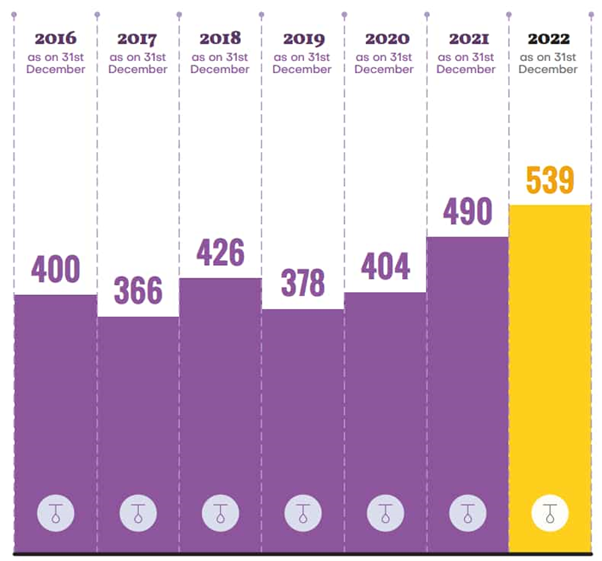Increase in Death penalty by trial courts
Context
According to the Annual Death Penalty Report 2022, Indian courts in 2022 awarded a record 165 death sentences, the highest in over two decades.
About the report:
- Released by: ‘Project 39A’, a criminal reforms advocacy group with the National Law University, Delhi.
- Key highlights:
- According to NCRB data, 165 death penaltieswere awarded by trial courts since 2000.
- The corresponding figure for the last five years was;
- 146 in 2021, 78 in 2020, 104 in 2019, 163 in 2018, and 110 in 2017.
- Sole decision taken by trial courts: The report notes that 3% of the death penaltycases were decided by trial courts “without any materials on mitigating circumstances of the accused and without any state-led evidence on the question of reform.”

What is the death penalty in India?
- Hanging and shootingare the two methods of the death penalty in India.
- According to the Criminal Procedure Code, hanging is the method of execution in the civilian court system.
- The Army Act, of 1950,however, lists hanging and shooting as official methods of execution in the military court-martial system.
- Under the provisions of criminal procedure, the death penalty must be awarded as an alternative punishment to life imprisonment which the offenders may be sentenced to in 'rarest of rare cases'.
|
Rarest of rare cases Rarest rare cases can be described as those when the murder is committed in an extremely brutal, ridiculous, diabolical, revolting, or reprehensible manner so as to awaken the intense and extreme indignation in the community. When total depravity and cruelty are the motives behind a murder. |
The process to grant a death sentence:
- Mercy petition process: For a convict to file a mercy petition, his/her death sentence must be confirmed by a high court first.
- The law says: “The death sentence convict can appeal to the Supreme Court. If the Supreme Court either refuses to hear the appeal or upholds the death sentence, then the convict or his relatives can submit a mercy petition to the President of India (Articles 72) or the Governor of the State (161).
- Grounds to seek mercy appeal: physical fitness, age, the law was too harsh, or the convict is the sole breadwinner of the family.
- According to Article 72 of the Constitution, the power to pardon — the philosophy of which is “every civilised country recognises and provides for the pardoning power as an act of grace and humanity in course of law” — lies with the President.
- The Article also states that he/she can grant pardons, reprieves, respites or remissions of punishment or suspend, remit or commute the convict.
|
The mercy petition is reviewed by the Ministry of Home Affairs, which consults the state involved, before going to the President. |
Supreme Court’s stand:
- A three-judge bench headed by then Chief Justice of India U U Lalithad referred the issue of reconsidering death penalty sentencing to a five-judge bench.
- The court had asked for a “uniform approach” to granting real and meaningful opportunities to convicts on death row.
- The court has also mandated trial courts to collect psychiatric and psychological evaluations of the convict before holding that there is no possibility of reform and awarding a death sentence.
What are the issues in the current system?
A Supreme Court Bench led by Justice U.U. Lalit made the following observations:
- Quick decision: In some cases, trial courts sentence a person to death merely hours after conviction.
- Little effort to unearth the issue: Little effort is taken to unearth or understand the circumstances which led a person to commit the crime. In short, trial judges hardly know the people they are sending to the gallows.
- Ignored individual details: No effort is ever made to dig deeper into a convict's childhood experiences, multi-generational history of physical and mental health issues, exposure to traumatic events and other familial, social and cultural factors crucial in order to undertake an individualised sentencing enquiry.
- Mitigation expert: The court said a "mitigation expert", a qualified professional with unhindered access to the convict's past, ought to be at the centre of this change in outlook.
- This 'one-size-fits-all' approach while considering mitigating factors during sentencing should end. A more enlightened approach has to be evolved. The apex court's introspection may be a sign of the judiciary veering away from the death penalty.
Capital punishment founds its place in international human rights treaties as a facet of the right to life as imbibed in “International Covenant on Civil and Political Rights (‘ICCPR’)”, it was later discovered that implementation of capital punishment violates the norms of the prohibition against cruel, inhuman, and degrading treatment and punishment. With the enforcement of the second ICCPR, there had been an increasing trend towards the removal of capital punishment as a way of punishment. |





